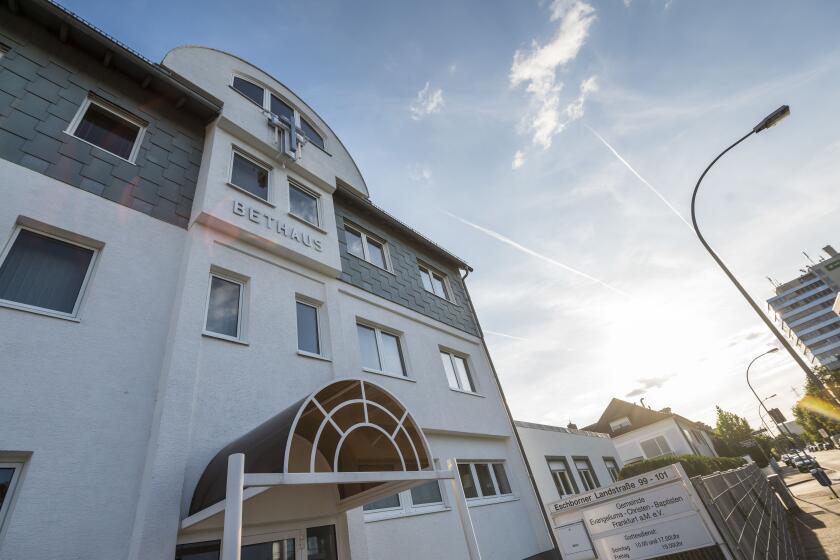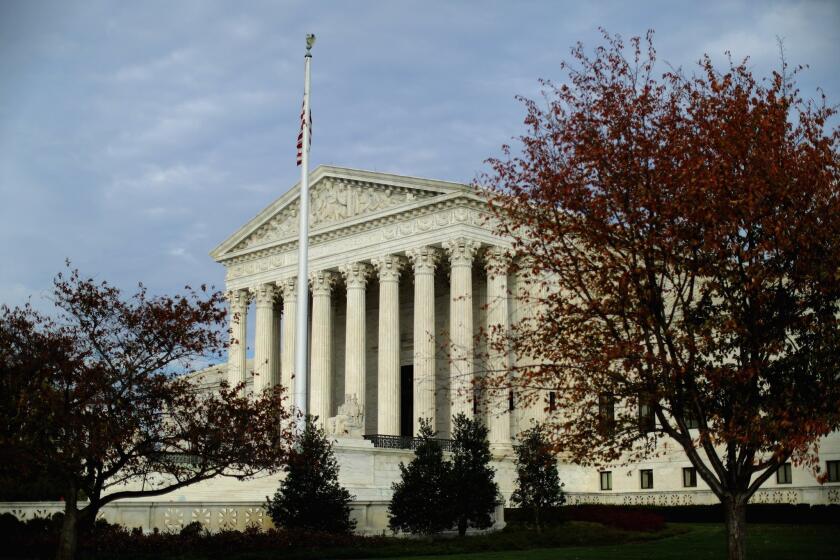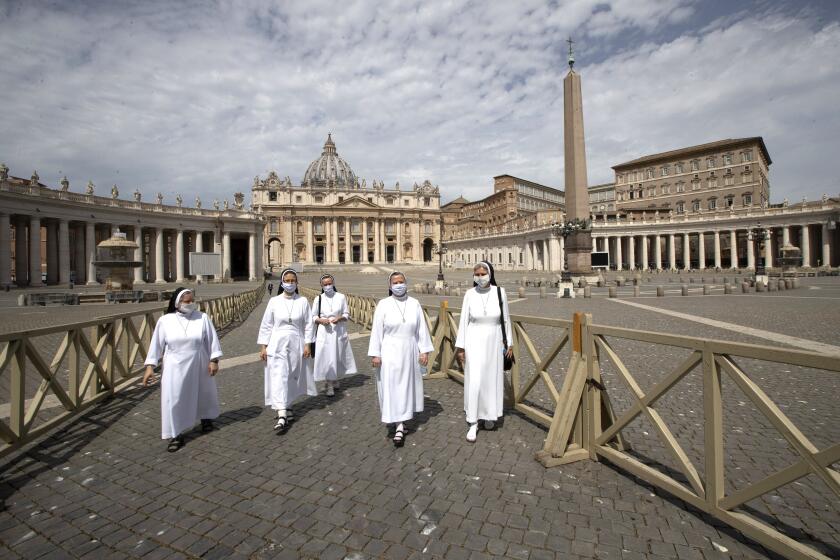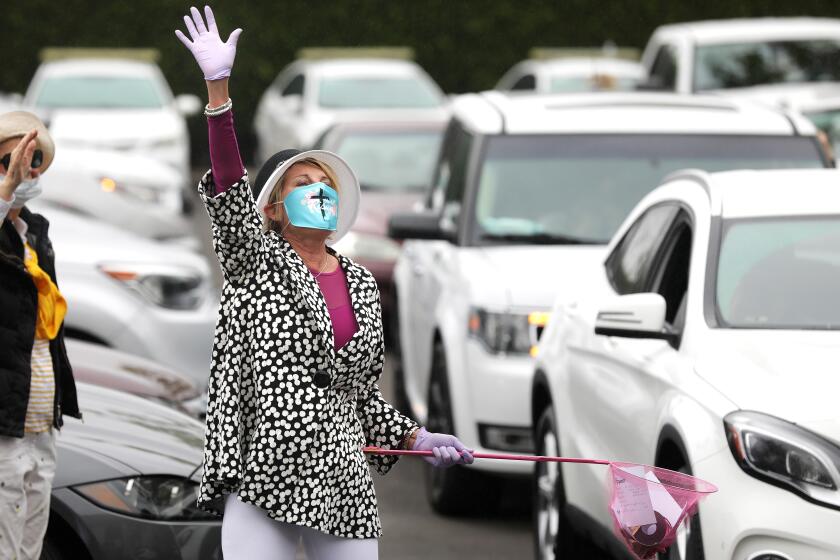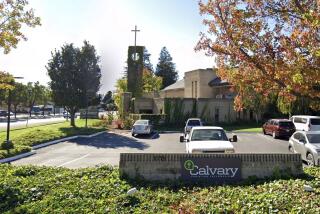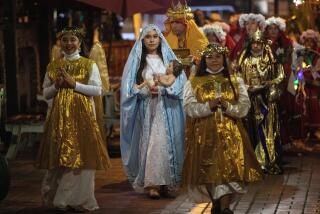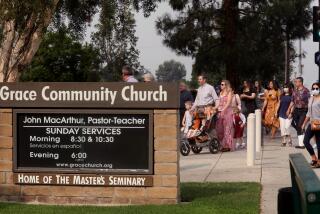Churches plan big Pentecost services despite orders: ‘It’s part of our faith to be together’
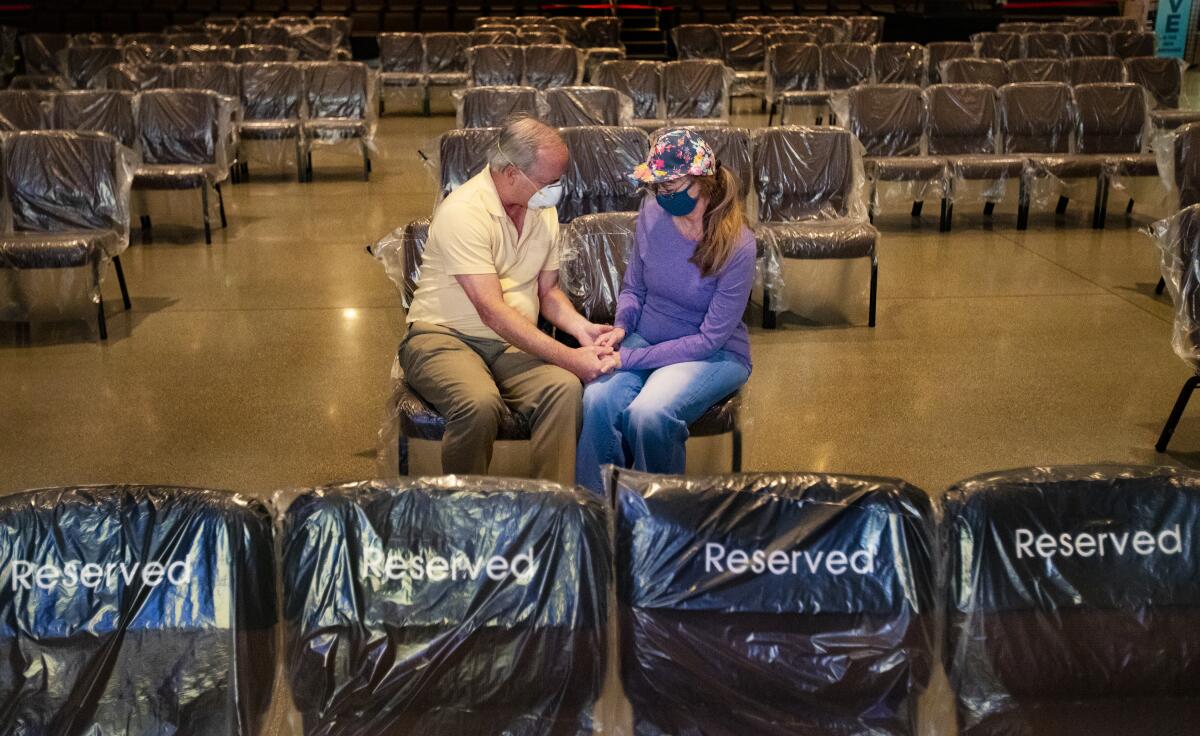
- Share via
The three pastors planned to meet at church on a weekday morning in early May. Two months after shutting down all in-person gatherings to stem the spread of the novel coronavirus, their houses of worship were still closed — and the men were determined to bring the word of God to their parishioners in need.
But news of the meeting spread like sparks from kindling, and more than 40 representatives of roughly 1,500 California churches showed up. They sat six feet apart, masks covering their mouths and noses.
“We said, ‘Here’s what we’re looking at if we open up — the ramifications, the liabilities,’” recalled Pastor Dan Carroll, who hosted the forum at Water of Life Community Church in Fontana. “We said, ‘How do you guys feel?’ The resounding sentiment was, ‘We plan to open.’”
Since then, the pastors’ action has exploded into a much larger movement that now includes dozens of evangelical Christian churches throughout the state, as well as other faith communities. More than 1,200 pastors vowed earlier this month to hold in-person services on May 31, Pentecost Sunday — a move that at the time defied California’s moratorium on such practices, which had been designated as part of Stage 3 of the state’s reopening plan.
What began as a public health debate has quickly escalated into a dispute over freedom of worship in several states. In California, pressure has built steadily on Gov. Gavin Newsom to ease the rules governing religious services, even as examples mount of the virus spreading through faith gatherings.
In a separate standoff, the U.S. Supreme Court on Friday rejected a challenge to California’s limits on religious gatherings during the pandemic brought by South Bay United Pentecostal Church in Chula Vista. The justices voted 5-4 that, at least for now, California can enforce its restrictions.
A leader in dealing with the coronavirus, Germany has reopened its houses of worship — but a new coronavirus outbreak shows that risks remain.
“The precise question of when restrictions on particular social activities should be lifted during the pandemic is a dynamic and fact-intensive matter subject to reasonable disagreement. Our Constitution principally entrusts ‘the safety and the health of the people’ to the politically accountable officials of the states ‘to guard and protect,’” Chief Justice John G. Roberts wrote for the majority.
Under updated state guidelines issued Monday, houses of worship must limit total attendance to 25% of a building’s capacity or a maximum of 100 people, whichever is lower. The Roman Catholic Archdiocese of Los Angeles has released guidelines to reopen churches for private prayer and public Mass as early as this week. Parishes must receive their regional bishop’s approval for reopening after meeting safety criteria to prevent crowding and physical contact as much as possible.
To Carroll, whose church boasts a 3,300-seat sanctuary, the reopening rules are still too restrictive. He plans to hold three services over the weekend — one Saturday afternoon and two on Sunday — at 10% capacity, or about 330 people.
“The governor’s office asked our thoughts, and we said, ‘Twenty-five percent or 100 people; you’re giving everyone else more,’” he said. “A cap at 100 people is not realistic. It’s not what they’re doing with big-box stores. We think it’s discriminatory.”
Supreme Court rules in a case in which a San Diego-area church challenged Gov. Gavin Newsom’s order limiting attendance because of the coronavirus.
Diego Mesa, pastor of Abundant Living Family Church in Rancho Cucamonga, said he feels that churches were never fairly considered in the state’s stay-at-home plans. There’s a discrepancy, he said, between “what happens in our building versus what happens in Home Depot.”
The new guidelines work for 90% of churches but do “no good” for megachurches like his, he added. Abundant Living plans to hold four Pentecost services in its 79,000 square-foot sanctuary, at a maximum of 700 congregants each.
“We are the ones who have been knocking on your door asking to meet with you, and again you overlooked us and did not sit down and reason with us,” he said, referring to faith leaders’ entreaties to the governor.
The shift in rules for houses of worship comes as Newsom faces lawsuits from religious groups over California’s stay-at-home rules, as well as mounting local pressure and demands from the Trump administration. President Trump on May 22 declared that he was designating churches as “essential” businesses so they could immediately reopen.
The U.S. Justice Department has warned Newsom that the restrictions he imposed and his plans to scale them back could infringe on religious groups’ constitutional freedoms.
Eric S. Dreiband, an assistant attorney general and the head of the Justice Department’s civil rights division, questioned Newsom’s decision to keep houses of worship closed until the third phase of the state’s reopening plan, while allowing restaurants, offices, shopping malls and schools to open in the second phase.
Dreiband cited a statement from U.S. Atty. Gen. William Barr that religious institutions “must not be singled out for special burdens.”
“It’s part of our faith to be together and have fellowship together,” Carroll said. “This is not entertainment. This is not a gathering of strangers, like baseball or basketball.”
But in the state and across the country, infections have been linked to large religious gatherings.
Italy and the Vatican are opening a new post-lockdown phase in the virus emergency.
A church in a Sacramento suburb became the epicenter of an outbreak when more than six dozen of its members tested positive for COVID-19 in April. In Butte County, a person who attended an in-person religious service on Mother’s Day tested positive, exposing 180 people. And in March, 45 people became infected with the virus, and two died, after attending choir practice at a church in Mount Vernon, Wash.
Churches opening Pentecost weekend said they had strict measures in place to ensure parishioners’ safety.
At Calvary Chapel Chino Hills, Pastor Jack Hibbs plans on marking spots in the church to keep worshippers six feet apart. San Bernardino County recently removed requirements for face coverings to be worn in public, he said, so masks are “invited but not required.” The church will provide masks.
The church has also reduced the capacity for its service, from 3,000 seats to 1,200 in the sanctuary. Parishioners must have tickets, which are free of charge, to attend. Hand sanitizing stations will be placed throughout the church campus, Hibbs added, and a certified cleaning company will sanitize throughout the day.
Other churches have implemented similar measures.
“We’ve been doing this for 30 years; we’re not going to trip over ourselves like a dummy,” said Hibbs, whose flock includes Democrats and Republicans alike. “This is a big deal; our nation has gone through a crisis. It’s not a left or right issue.”
This Easter, church services looked a bit different. From drive-in ministries to online Mass, Southern Californians found creative ways to celebrate.
But the argument over houses of worship reopening is just as much about politics as it is about legal doctrine or public health, said Nomi M. Stolzenberg, the Nathan and Lilly Shapell chair in law at USC’s Gould School of Law.
The administration’s legal position is “debatable,” she said, but the federal government has been “making very intimidating arguments.”
“I think it has to be political,” Hibbs said. “That’s exactly why we have a republic and a representative form of government — to represent our very needs, our wishes and desires.”
Both Mesa and Carroll said they don’t consider themselves “lawbreakers” or rebels. The move to reopen their churches with or without the governor’s permission wasn’t a political statement, they said.
“We’re not just Trump supporters. They just want to throw us into a pot and boil us,” Carroll argued. “We’re just a super mixed-race church, and that’s the reality for us. It has nothing to do with Trump or Newsom; it has everything to do with Jesus and worship for us.”
In the end, Mesa acknowledged, he is happy the federal government supported their cause.
“Whether it was Joe Biden or Bernie Sanders making that appeal, if you asked me, I would still be true to myself and say, yes, I am happy we have people who now see our stance,” he said. “It has nothing to do with a Republican agenda so much as finally some people of influence are speaking out and seeing us now as essential.”
More to Read
Sign up for Essential California
The most important California stories and recommendations in your inbox every morning.
You may occasionally receive promotional content from the Los Angeles Times.
